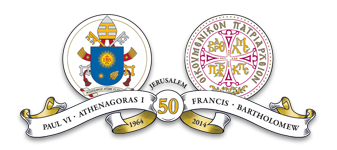Summary of Joint Declaration by Ecumenical Patriarch Bartholomew and Pope Benedict XVI (November 30, 2006)
1. The filial meeting of the two Church
leaders renews their commitment to work
towards the restoration of Full Communion
between the two Churches, which is God's
will and command.
2. The two Prelates recalled with gratitude their predecessors, Pope Paul VI and Pope John Paul II, as well as Ecumenical Patriarchs Athenagoras and Dimitrios, who lead the path towards the reconciliation (abatement) of the two churches, through their meetings and mutual visits, as well as the lifting of the 11th Century anathemas between Rome and Constantinople. They call on (implore) the faithful of both Churches to strengthen their prayers and endeavors towards the unity of the Churches.
3. They express their joy and satisfaction for the recommencement of the official Theological Dialogue between the two Churches, as well as for the recent meeting of the plenary session of the International Joint Commission for Theological Dialogue in Belgrade, offering their full support to its works.
4. They underline the duty of the Church to carry the message of the Gospel to the modern world, and especially to Christian countries, where secularization, relativism and even nihilism is observed, particularly in the West. The common heritage of the two churches should take into account modern cultural trends, quests as well as the problems of humanity in today's world.
5. Referring to the formation of the European Union, they stress the following: "We evaluated positively the path towards the shaping of the European Union. The key players in this huge endeavor will surely take into account all that is related to human beings and their non-negotiable rights, especially religious freedom, which is proof and assurance of respect for all other freedoms. In every initiative for union, minorities, with their cultural rights and religious distinctiveness should be protected. In Europe, both Orthodox Christians and Roman Catholics, while remaining open to other religions and their contribution to culture, should unite their efforts to safeguard Christian roots, traditions and values, in order to preserve respect for history and to also contribute to the culture of a future Europe, as well as to the quality of human relations at all levels. In this respect, how could we not refer to very ancient martyrs and to the glorious Christian heritage of the land, in which we are meeting, beginning with the words of the Book of the Apostles for Saint Paul, Apostle to the Nations? On this land, the message of the Gospel and ancient philosophical tradition have met. This bond, which contributed to our common Christian heritage, remains current and will in the future bear fruit for the promotion of the Gospel and for our unity".
6. They turn their eye towards the lands where Christians face difficulties and where wars, terrorism and famine prevail as well as the exploitation of the poor, of immigrants, of women and children.
They call on Roman Catholic and Orthodox Christians to take up common action for the respect of human rights for all people and the protection of human life from the slaughter of innocents, especially when it is carried out in the name of God.
In particular, they turn their eyes to the Middle East, where the Lord lived and where Christians have been living for centuries. They stressed the need for the restoration of peace in the area and for a peaceful coexistence and cooperation between the people, churches and religions, and they encourage interfaith dialogue in order to counter violence and discrimination in every form.
7. They express their concern in the face of great dangers stemming from the destruction of the natural environment and the negative consequences for humanity and all creation, caused by uncontrolled economic and technological progress. As spiritual leaders, they support every effort for the protection of the natural environment, so that an (intact) unharmed planet is inherited by future generations, where they could live.
8. Finally, they turn to all faithful Roman Catholic and Orthodox Christians around the world, clergy, monks and laypeople, giving them their blessing and their reassurance that they shall have their prayers and their love, as well as to all other Christians, with whom they are willing and ready to come into dialogue and cooperation.

